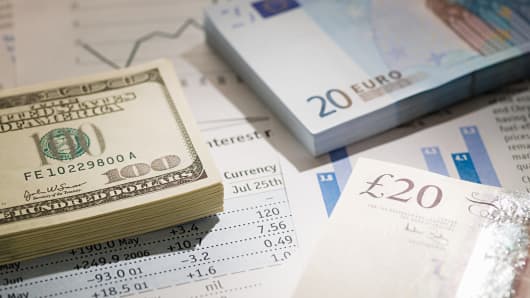With the yen just a whisker away from the key $100 level on Monday, one analyst said that ultra-loose monetary policy has won over the G-20 and "currency wars" are now a thing of the past.
Debate has escalated in recent months as to whether countries are deliberately debasing their currencies to boost exports, with the Federal Reserve, the Bank of Japan and the Bank of England all undertaking monetary easing programs, which can weaken currencies.
However, Friday's meeting of G-20 finance ministers and central bank governors indicated these policies will not be clamped down on, according to Marshall Gittler, head of global forex strategy at IronFX.
(Read More: Close, Yet So Far: Yen Takes Another Stab at 100)
"The currency wars are over. At the G20 meeting, foreign exchange was not the contentious topic it had been at the previous meeting in February," Gittler said in a research note on Monday.
In particular, Gittler noted that Japan received praise rather than criticism for its aggressive stimulus program, which the G-20 described as appropriate and welcome.
"Japan's recent policy actions are intended to stop deflation and support domestic demand," said G-20 leaders in a press release after last week's meeting.
The Bank of Japan announced its latest stimulus plan in early April, saying it would buy 7 trillion yen ($70 billion) in long-term government bonds every month.
(Read More: Yen Bears in Driving Seat After G20, USD/JPY Targets 100)
"Loose monetary policy is no longer viewed suspiciously as part of a 'currency war'. Rather, it is considered to be necessary and appropriate for the goal of fostering recovery," said Gittler.
The G20 statement added that leaders should be mindful of the "unintended" side effects of lengthy periods of monetary easing. Gittler said the use of the word "unintended" indicated the G-20 views monetary stimulus as a valid means to boost economic recovery, rather than one intended to debase currencies.
"This is in effect the green light for the Bank of Japan's easing," he said.
Other analysts disagree that the currency wars are over however.
(Read More: Currency Wars Return, 1930s Style: Who Will Lose Out?)
"I have a different view, I think this is 'race to the bottom'...and that puts pressure on global markets in some respects, but right now this global liquidity boost is massive for risky assets and yields," Benoit Anne, head of emerging market strategy at Societe Generale told CNBC on Monday.
"Currency war is probably negative for Asia, but it is really good for the rest of the world," he added.
The yen has fallen by around 16 percent against the dollar year-to-date. On Monday morning, the yen was trading at around 99.8 to the dollar.
—By CNBC.com's Matt Clinch; Follow him on Twitter @mattclinch81



